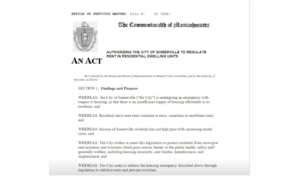The document causes officials and community members to ask, what should the role of police be in schools?
(Somerville Wire) – Justice for Flavia, an organization that was established in the aftermath of a case where Somerville Public Schools called police on a 6-year-old boy, released a model MOU for school districts and police departments, on Dec. 1. The MOU calls for the permanent end of the School Resource Officer and Students and Teachers Engage Public Safety programs, in light of a vote that took place last spring to suspend all police programs in the schools. Flavia Peréa, the mother of the student who the school reported on, said that bringing police into the lives of young children could have “profound and [negative] long-term consequences.” By terminating police presences in public schools, Peréa said that she hopes this step will help interrupt the school to prison pipeline that so many students of color live through.
“In terms of the literature, we know that having police in schools does not result in the kind of positive public safety outcomes that are used as a reason for having police in schools. What they effectively do is turn children, such as my son, into potential perpetrators,” said Peréa. “They criminalize children. The racial contours, the disproportionate impact on Black and Latino children have been clearly established. That’s kind of compounded with the vast literature on implicit bias, in particular, in educational settings where it’s known that school personnel … will see children on the basis and interpret or draw conclusions about their actions, their choices, their language, their behaviors, in ways that are much more incriminating and severe than they might otherwise for white majority children.”
STEPS had been created to serve as a program that would pair police officers with middle school classes to serve as mentors to students, moving along with their assigned classes until the students graduate from high school. The SRO program positioned a police officer directly within Somerville High School, but when the Somerville Wire asked what exactly the responsibilities of the SRO were, School Committee Chair Andre Green declined to comment and said that this should be a topic of conversation. The model MOU proposes that while these two programs would be ended in schools, there are emergency situations when police should be called in, such as in case where a weapon is being used or a bomb threat has been made. This MOU, however, seeks to cover non-emergency situations, where schools cold call in social workers or mental health counselors, in place of police officers. At a Sept. 27 School Committee meeting, Superintendent Mary Skipper said that mental health counselors may be stretched too thin, which newly elected School Committee member Sara Dion said could be resolved by dedicating more funding to employing new councilors.
“I think it would be more effective to hire more school counselors and social workers to support the mental health of students,” said Dion. “I know that Officer [Oswaldo] Martinez [the former SRO at Somerville High School] had some degree of mental health training, but what you really want is people who are mental health professionals, school counselors and social workers, [where] providing mental health and social services is what they went to school for, what they are explicitly there for, and there’s not going to be that inherently adversarial relationship that certain students might feel towards a police officer.” She added, “There is a mental health professional shortage, right now, just like there’s a teacher shortage. I know that’s really difficult.” Meanwhile, Rep. Erika Uyterhoeven added that leftover money from COVID relief funding could be dedicated towards hiring new counselors.
At the Sept. 27 School Committee meeting, Skipper referenced two incidents where conflict caused by students broke out, a volleyball game and a Friday night football game, where police officers had to be called in. Problems have involved “students coming in and not listening, not taking direction from adults.” Students are facing challenges in adjusting to life at school, she said, particularly having been learning from home for some time, during the pandemic. The Somerville High School building is a new space that students are not used to, and they are dealing with a new freedom, in terms of navigating the setting. At the meeting, Skipper suggested that it might be beneficial to bring back the SRO program.
“I think, in general, our students are doing really well, given all they’ve been through. But they’re also having a really hard time with regulation. And it’s specifically regulation in unstructured time,” said Skipper, adding, “As you all remember, we suspended the SRO policy. But many of the students that were there when [Martinez] was there are missing [him] and a stabilizing force. … I just wanted everyone to be aware that the students are doing their best to reintegrate and regulate, but it’s hard for them.”
Following this meeting, there was another School Committee meeting on Oct. 4, where public comment allowed community members to vociferously voice their opinions on bringing back the SRO program.
Rep. Uyterhoeven read a statement from Matt Cregor, staff attorney with Mental Health Legal Advisors Committee, that said that bringing back the SRO as a disciplinarian would be violating the law. “By state law, School Resource Officers cannot serve as school disciplinarians. To quote the Mass General Laws, chapter 71, section 37p, SROs shall not serve as school disciplinarians, as enforcers of school regulations or in place of licensed school psychologists, psychiatrists, or counselors. The SROs shall not use police powers to address traditional school discipline issues. So in summary, bringing back SROs to help address school discipline issues runs afoul of state law.”
This past October, Green formally established a policing subcommittee, which is tasked with discussing the role of policing in schools and coming up with policies, to be recommended to the School Committee. While it was only formed recently, Green said that the idea of it had begun being explored before the pandemic. The subcommittee is composed of five stakeholder groups: three School Committee members, three administrators, three educators, three parents, and three students. Green decided upon who these members would be, except in the case of parents, who were required to submit applications. The group’s first meeting is intended to happen before the end of the year.
“The district needs to know a number of questions answered … not just the stuff about MOU but things like, if we’re not using police, for example, how do we physically stop fights?” said Green. “ … What is a situation where we use police? How do we handle data sharing in ways that are productive? If we’re not using police, what are we going to do? It’s actually a much broader mandate than MOUs.” He added, “Most of our attention is around the issue of, how does SPD respond to students who may be seen as or possibly be in a position of being offenders of some sort? … In practice, most of the things that happen when policing students is students-as-victims, and so, how do we manage that as part of the conversation, both internally and externally?”
Peréa said that she perceives the subcommittee as having been formed in secrecy and lacking in transparency, wondering why its members were predominantly hand-picked by the School Committee chair. She also noted that the principal of the Argenziano School, the school her son had attended when he was reported to the police, sits on the subcommittee. Green explained that the group’s meetings will be open to the public, but Peréa questioned the neutrality of the subcommittee.
“It kind of devolved into whatever this process is where there has been, from the beginning an emphasis on, [how] those of us who have been very loud voices in this conversation shouldn’t be at the table, which kind of presumes this absolutely absurd notion that there’s anybody out there who doesn’t have an opinion on this,” said Peréa. “That somehow there are people floating around who are unbiased.” She added, “There’s a lengthy history in Somerville on creating the illusion of community engagement, where someone decides they want to convene a committee or group of residents that will then inform policy. But as we’ve learned over the years … the decision has already been made before the committee has been formed.”
This article is syndicated by the Somerville Wire municipal news service of the Somerville News Garden project of the Boston Institute for Nonprofit Journalism.
All Somerville Wire articles may be republished by community news outlets free of charge with permission and by larger commercial news outlets for a fee. Republication requests and all other inquiries should be directed to somervillewire@binjonline.org. Somerville Wire articles are also syndicated by BINJ’s MassWire state news service at masswire.news.
SUBSCRIBE TO THE FREE SOMERVILLE WIRE EMAIL NEWSLETTER: https://eepurl.com/hpBYPv
Check out all our social media here: https://linktr.ee/SomervilleWire.
Shira Laucharoen is assistant director of the Boston Institute for Nonprofit Journalism and assistant editor and staff reporter of the Somerville Wire.





